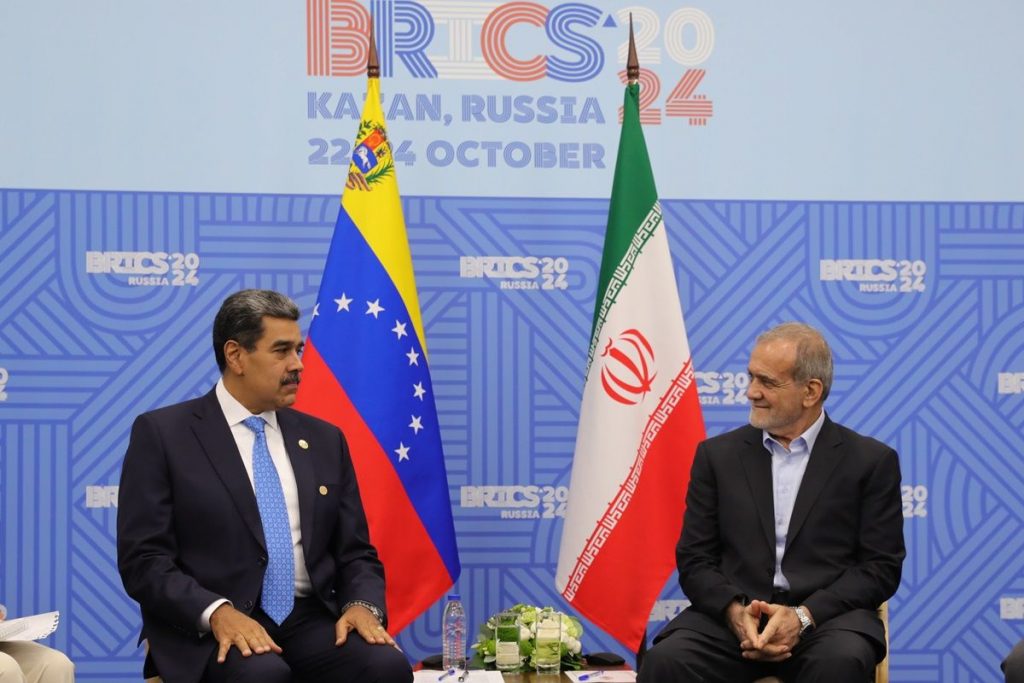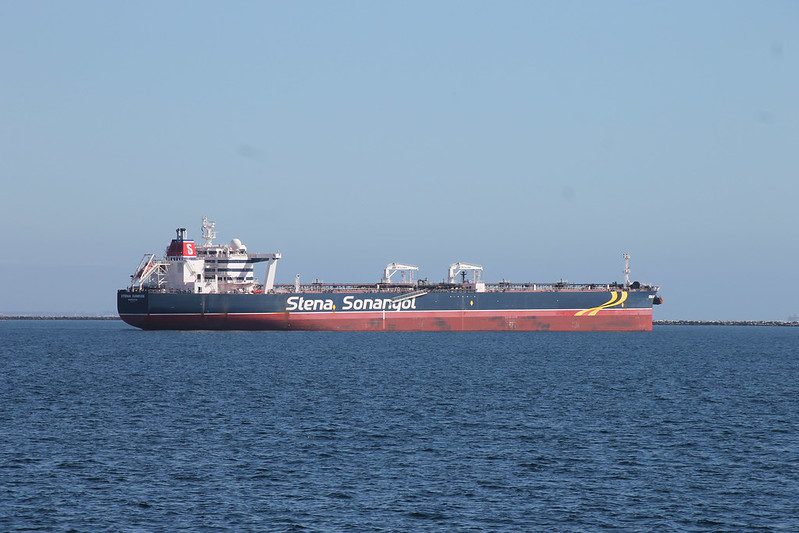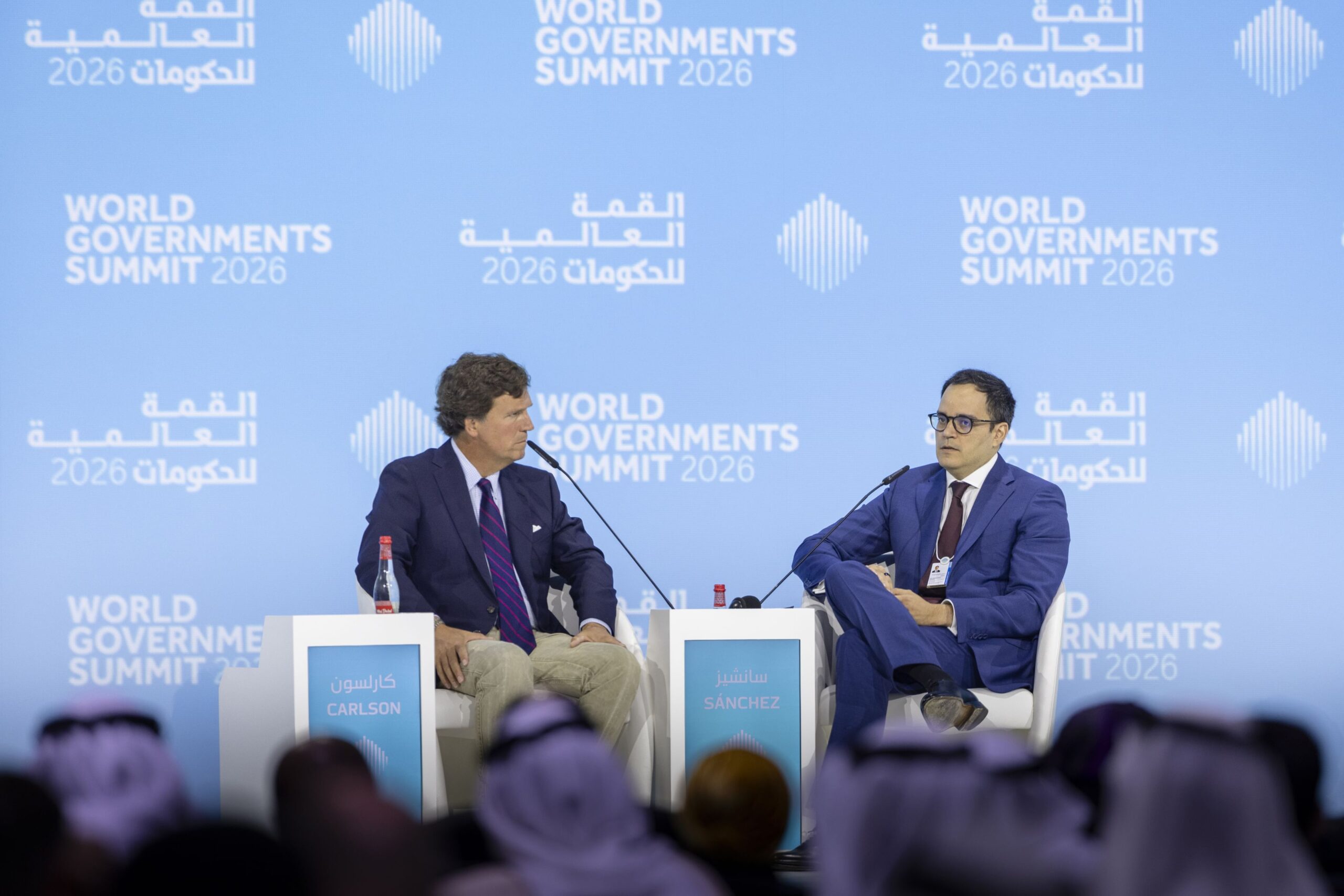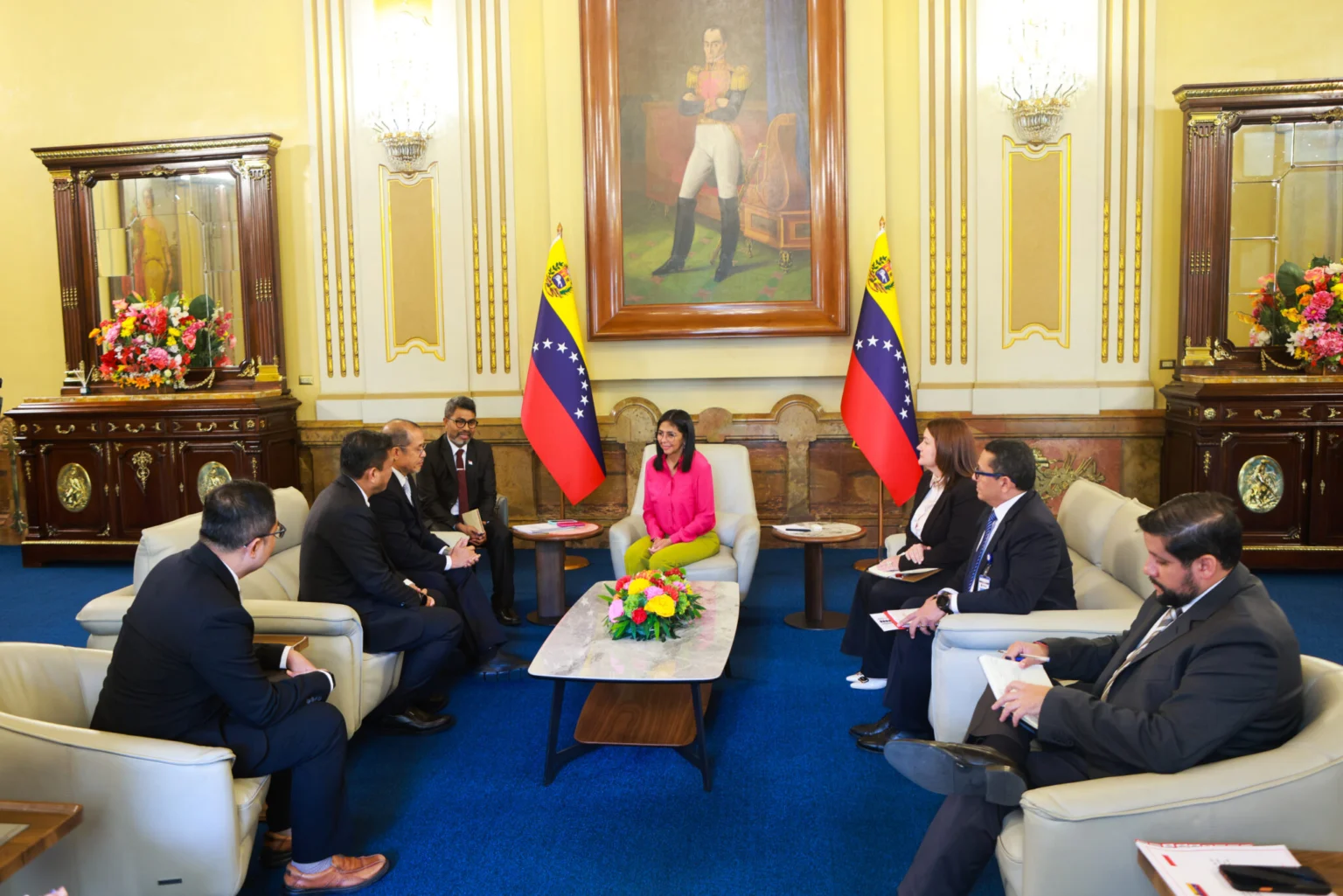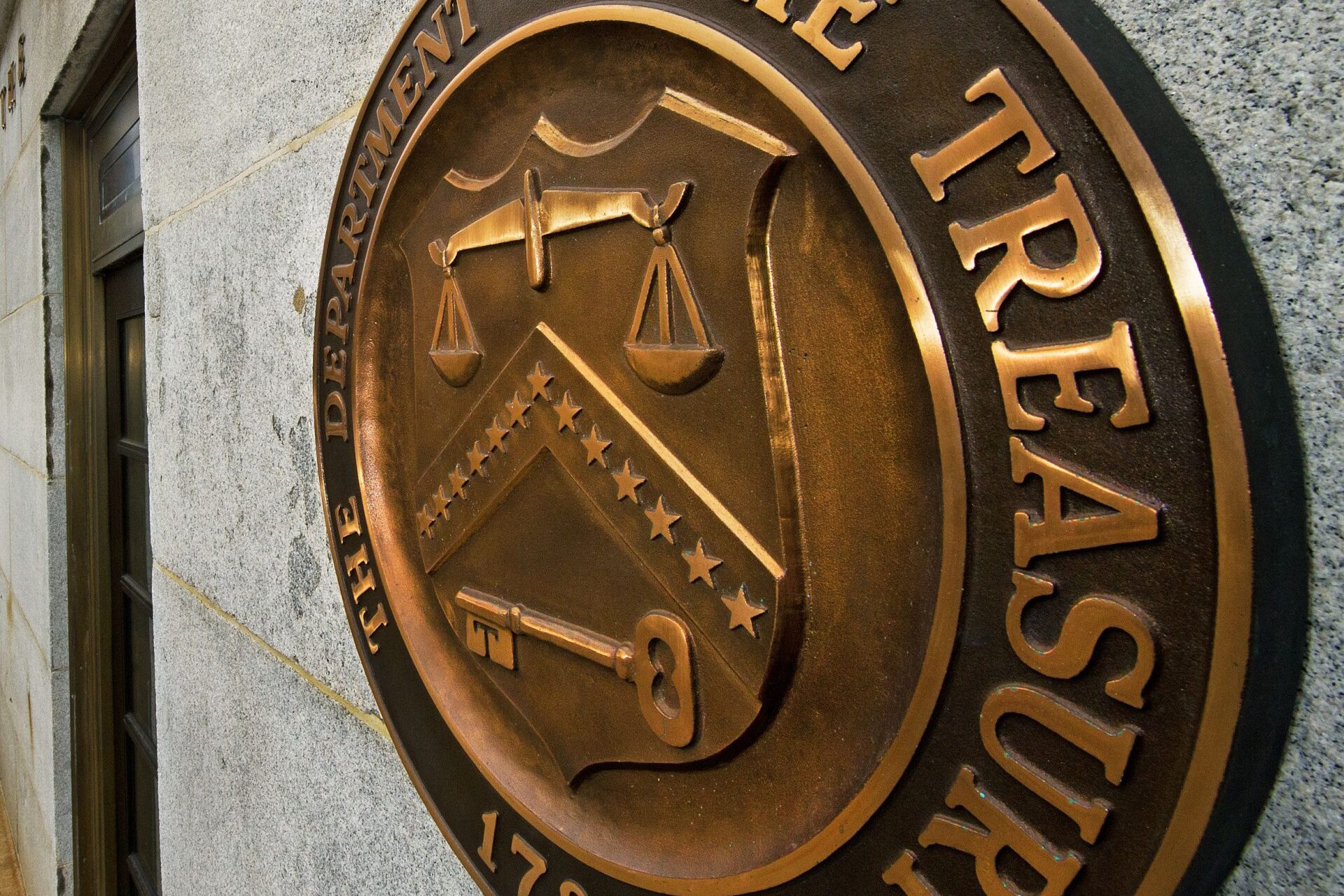Presidents Nicolás Maduro of Venezuela and Masoud Pezeshkian of Iran, in a bilateral meeting during the BRICS+ summit in Kazan, Russia in October 2024. Photograph: Ministry of Communication.
Guacamaya, June 11, 2025. Iran and Venezuela are approaching the finalization of a trade agreement that will eliminate tariffs on raw materials and other goods between the two nations. The latest version will be finalized in the coming days, according to the Iranian Deputy Minister of Commerce, Hamid Dehghan, in a meeting in Tehran with his counterpart, the Venezuelan Johann Álvarez.
Both countries are preparing to sign a free trade agreement that could further deepen their economic ties. According to the Iranian Deputy Minister of Commerce, officials from both nations are finalizing the technical aspects of the pact, which will cover a catalog of goods with no import tax. Dehghan emphasized that this pact will benefit both countries “equally and amicably,” and will help increase a significant rise in mutual trade.
“The agreement allows Iran and Venezuela to serve as trade hubs in Asia and South America,” declared the Iranian representative to the media outlet Hispan TV in a prolonged discussion in Tehran with the Venezuelan Deputy Minister of Foreign Trade Promotion and Investment.
Meanwhile, Álvarez emphasized that the current trade between the two nations does not reflect the strength of their political connections and that the agreement will create new opportunities for Iran to invest in Venezuela’s key industries.
The news also comes after the Venezuela-Iran Business Meeting on June 1, which was held at the Eurobuilding Hotel in Caracas. Representing Tehran was the president of the Islamic Consultative Assembly, Mohammad Baqer Qalibaf.
In February, Ahmad Firuzi, head of the European and American Trade Development Organization of Iran, recalled that Iran and Venezuela had agreed on a trade deal two decades ago, but it was never put into action. The reuse of that tool has recently accelerated due to the push from the current Iranian government.
Then, Firuzi mentioned that the new agreement will make it easier for Iranian products to reach the Venezuelan market and other Latin American nations, while reducing transportation costs and increasing competitiveness against players as he also emphasized the need to expand the range of Iranian goods for sale and strengthen their trade links in the area.
The upcoming signing of the agreement, anticipated to happen soon, could serve as an important means to avoid global penalties and improve the south-south partnership between two nations with similar political goals.
Context matters: Iran talks with the United States about nuclear issues while strengthening ties with Venezuela
All this occurs at the same time as the international context is wrapped in major tensions: Iran is having ongoing indirect conversations on nuclear issues with the United States, with Oman as a mediator. The result of those conversations will have significant geopolitical implications for both the Middle East and the global energy market. Tension has grown after the possible failure of negotiations and the actions that Israel could take.
The United States for its part has not renewed oil licenses for Western companies such as Chevron to continue their operations in Venezuela. In addition, public tensions have increased between Washington and Caracas, however negotiations have also been maintained regarding migration and the release of detainees.
Both Caracas and Tehran have been targets of Trump in both administrations, therefore they reinforce their ties in the face of possible pressure measures and greater isolation from the West. Iran already played an important role in countering the U.S. sanctions imposed on Venezuela in 2020, even reaching moments of tension with Washington over the shipment of gasoline ships to the Caribbean country.
Iran: sanctions, resistance and strategic alliances
Iran’s push for an agreement with Venezuela cannot be understood without considering the complex system of multilateral and unilateral sanctions, which it faces and has faced. Since 2006, Iran has been under UN sanctions for its nuclear activities, and since 1979, the United States has imposed a continuous regime of economic sanctions, which became stricter in 2018 with the U.S. withdrawal from the nuclear agreement (JCPOA).
These sanctions have greatly harmed its economy, decreasing oil sales, restricting access to currency, isolating its banking system from the swift network, and causing social impacts such as rising prices, shortages, and declining living conditions.
In response, Iran has implemented a diverse resistance approach since 2012 when Ali Khamenei promoted the concept of a “resistance economy” based on reorientation toward national production. It also developed a clandestine oil sales scheme through Malaysia, an intermediary also used by Venezuela.
The diversification of economic partners such as China, Russia and Venezuela has been key to moving Iranian products and obtaining revenue.
Alternative trade has also been used: barter, cryptocurrencies, non-Western currencies have gained strength to evade sanctions through non-oil exports.
The Iranian strategy consists of two fundamental axes:
- Encourage national goods and reduce foreign goods. A strategy led by Iran’s leaders with the aim of reducing dependence on external factors.
- Independent military growth: focus on rockets and unmanned aircraft, including drone manufacturing.
The case of Iranian autarky and its evasion scheme to sell oil clandestinely has been studied by countries such as Russia and of course that model for the authorities of Venezuela has also been the subject of attention.
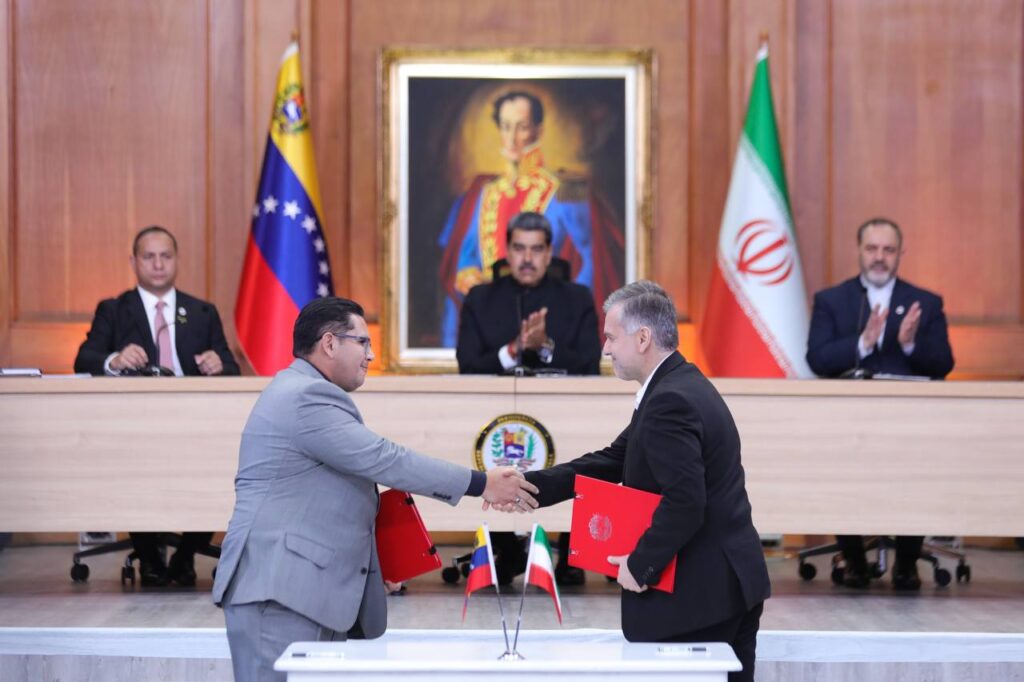
An informal axis of sanctioned nations: Iran, Venezuela, Russia and North Korea
The agreement between Tehran and Caracas is part of a growing pattern of collaboration among nations targeted by Western sanctions, which includes Iran, Venezuela, Russia, North Korea. These nations have strengthened their collaboration among several of them through:
- Energy and logistics agreements to sell oil, refinery repairs and maritime trade for sanction evasion. Russia, Iran, and Venezuela have already tested the use of “zombie” fleets for the successful sale of oil on the black market.
- Digital currency teamwork, side-by-side banking and different money transfers instead of the U.S. dollar.
- Diplomatic alliances and mutual support in international forums such as the United Nations to deploy a strategy of denouncement and also of pressure for the lifting of multilateral and unilateral sanctions.
A clear example of this occurred with the oversight of sanctions on North Korea by the UN Security Council which was suspended by Russia, setting an important precedent for these cases.
In 2024, Moscow vetoed a draft resolution that sought to extend for one year the mandate of the panel of experts in charge of overseeing the sanctions, which had been supported by 13 of the 15 members of the body. China abstained. On the other hand, the rapprochement between the Democratic People’s Republic of Korea and Russia has weakened both the multilateral sanctions regime imposed on North Korea and the West’s efforts to isolate Russia in the context of the war in Ukraine. Both processes have partially failed, and have contributed to consolidating a growing cooperation among sanctioned countries, which in turn has reduced the effectiveness of these measures as a tool of international pressure. What happened with North Korea could be replicated in other sanctions cases.
The pattern of cooperation between North Korea and Russia — characterized by the exchange of strategic resources, military assistance and diplomatic support — reflects a broader trend among sanctioned countries seeking ways to circumvent or neutralize the economic pressures imposed by the West. Although the case of Iran and Venezuela presents differences in terms of objectives and scope, it is also part of this logic of alliances not aligned with the liberal international order.
Both Iran and Venezuela face severe sanctions regimes, especially from the United States, that have affected key sectors such as oil, finance, international trade and foreign investment. In the face of these restrictions, both countries have resorted to bilateral cooperation aimed at mitigating the effects of coercive measures, ensuring the flow of strategic goods and services, and creating parallel economic channels that allow them to sustain their productive activity and strengthen their geopolitical room for maneuver.
Unlike the cooperation between Russia and North Korea, focused on the military dimension and direct confrontation with NATO countries and their Asian allies, the Iran-Venezuela axis is more focused on the economic-commercial and energy field. However, in both cases a common pattern is observed: the informal configuration of cooperation schemes among sanctioned countries, with alternative payment mechanisms, local currency exchange or barter, use of cryptocurrencies and unconventional logistical networks.
These types of alliances not only seek to resist sanctions, but also to question the legitimacy and effectiveness of the use of sanctions as a tool of political pressure. Together, these cases reflect an evolution of the international system toward greater fragmentation and the emergence of new South-South cooperation networks, driven by the need for strategic autonomy in the face of Western powers.
What does it mean for Iran?
For Iran, creating strong commercial connections with Venezuela provides access to important resources and new markets, and also increases its ability to resist financial and geopolitical control by the United States. Meanwhile, Caracas acquires manufactured goods and a global ally that does not demand internal changes on the political issue.
The upcoming signing of the free trade agreement between Iran and Venezuela is more than an action of two countries: it is a political and economic declaration of independence from sanctions, and a sign of the changing global power structure. With it, their plan of economic opposition will be strengthened by forming partnerships with those similarly disadvantaged by the global system, while establishing themselves as important figures in the Middle East and Latin America.
After the non-renewal of oil licenses by the United States, Venezuela signed a ten-year Strategic Partnership and Cooperation Agreement with the Russian Federation. Vice President Delcy Rodríguez visited China, while President Nicolás Maduro met with Xi Jinping and Vladimir Putin in Moscow. Additionally, Venezuela may be close to signing a free trade agreement with Iran.

